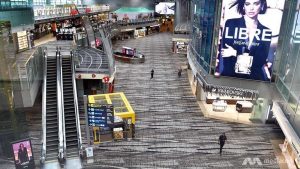
Changi Airport’s Terminal 3’s transit area during the COVID-19 outbreak.
SINGAPORE: Initial investigations show that is “unlikely” that a traveller from New Zealand who had transited in Singapore en route to South Korea was infected with COVID-19 during his stopover, Singapore authorities said on Friday (Jul 31).
The Ministry of Health (MOH) and Civil Aviation Authority of Singapore (CAAS) said: “Our initial investigations found that it is unlikely that the individual was infected during transit in Changi Airport as that would mean an incubation period of less than 24 hours.
“According to the World Health Organization, the average incubation period for COVID-19 infection is five to six days, with a maximum of up to 14 days.”
On Monday, New Zealand said that they were informed by South Korean authorities that the traveller may have been infected while in transit in Singapore.
The person had left New Zealand on Jul 21 and arrived in South Korea the next day after transiting through Singapore. A polymerase chain reaction (PCR) test was done about four hours after the individual’s arrival in South Korea, Singapore authorities said.
New Zealand’s health ministry said on Tuesday the person spent 14 hours and 20 minutes in a transit lounge at Changi Airport, along with people who had travelled from other parts of the world.
Before departing from New Zealand, the individual was on a domestic flight from Auckland to Christchurch. Close contact tracing of passengers on the domestic flight has been completed, New Zealand’s health ministry said on Thursday.
“Singapore is in contact with the New Zealand and South Korea authorities for further information,” MOH and CAAS said on Friday.
“The source of infection remains unknown and investigations by the various authorities are ongoing. As an added precaution, contact tracing in Singapore is also underway.”
They outlined the “stringent measures” taken at Changi Airport to ensure that transiting passengers are segregated from other passengers “at all stages of their journey – both in flight, and at the airport”.
“In addition, all passengers travelling through Changi Airport are required to wear masks at all times, while airport staff wear personal protective equipment when interacting with passengers,” said the joint reply to CNA’s queries.
Safe distancing and temperature taking for passengers and staff are also enforced.
“All transit passengers, including those who had arrived on the same flight as the individual, adhered to these precautionary measures,” MOH and CAAS added.
POSSIBLE SOURCES OF INFECTION
On Friday, New Zealand’s health ministry said that “there continues to be no evidence of transmission” in the country involving the traveller.
All domestic contacts of the case tested to date have returned negative results.
It earlier said it was considering four possibilities about the case: That it may have been a false positive result, that it may be an old infection which has returned a positive result, that it was a case recently acquired in transit or that it was a case recently acquired in New Zealand.
The possibility of a false positive was ruled out after New Zealand’s health ministry received the result of a second positive PCR test from South Korean authorities.

